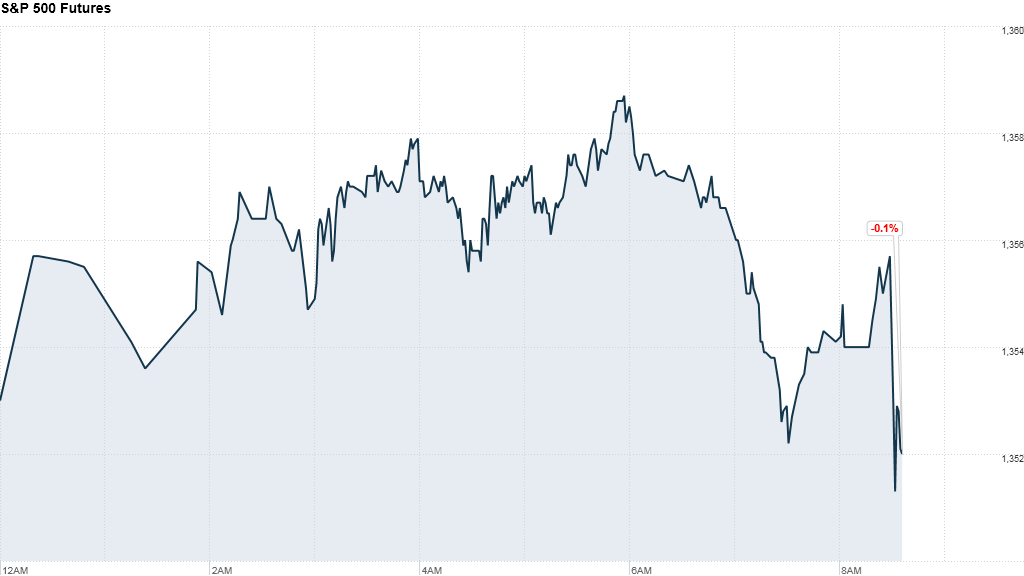U.S. stock futures signaled a mixed open Thursday, as investors weighed a bigger-than-expected jump in jobless claims and turmoil overseas.
Early Thursday, investors were mulling over global headlines. China's ruling Communist Party named its next seven leaders, the eurozone officially entered a double-dip recession and Israel launched a series of blistering air strikes Wednesday on what it said were terrorist targets in Gaza.
BP (BP PLC) said it was close to signing a deal with the U.S. government to resolve criminal claims from the 2010 Deepwater Horizon disaster in the Gulf of Mexico. But above all else in the United States, fiscal cliff fears remain a heightened concern for market participants.
"With expected tax increases, investors are looking for opportunities to sell as opposed to reasons to buy," said Jay Feuerstein, CEO and CIO of 2100 Xenon. "Our stock market tries to rally and then by midday falls flat. I'm looking for any news or hint of conciliation politically, otherwise I think it's dangerous trading."
President Obama met with CEOs Wednesday to discuss the fiscal cliff and is scheduled to meet with Congressional leaders Friday.
The report on initial jobless claims showed the lingering effects of Superstorm Sandy in the Northeast: 439,000 people filed for their first week of unemployment benefits last week. That was much higher than the forecast of 388,000 in jobless claims and it is the highest jobless claims tally since the last week of April, 2011.
Meanwhile, the Consumer Price Index showed that inflation remained tame in October, ticking up 0.1% during the month, as expected.
The Federal Reserve Bank of Philadelphia will release its monthly manufacturing survey at 10 a.m. ET.
Around 1:20 p.m. ET, Federal Reserve Chairman Ben Bernanke is due to deliver remarks on the housing market at an event in Atlanta. Regional Fed presidents Jeffrey Lacker of Richmond, Charles Evans of Chicago, Richard Fisher of Dallas and Charles Plosser of Philadelphia are also scheduled to give speeches Thursday.
U.S. stocks fell more than 1% Wednesday.
The eurozone officially slipped into recession in the third quarter, as official figures showed growth among the 17 euro countries shrinking 0.1%. It's the second recession in the area since 2009.
European stocks were lower Thursday morning. Britain's FTSE 100 shed 0.4%, the DAX in Germany lost 0.9% and France's CAC 40 fell 0.5%.
Full coverage on Europe's Debt Crisis
On Thursday, China's ruling Communist Party named seven men to its powerful Politburo Standing Committee in a highly orchestrated ceremony that emphasized party unity and held out little immediate prospect of bolder economic reforms.
Asian markets ended mixed. The Shanghai Composite dropped 1.2% and the Hang Seng in Hong Kong dropped 1.5%%, while Japan's Nikkei surged 1.9%.
Related: Meet China's new leaders
Wal-Mart (WMT) shares slid 3% in premarket trading, after the retail giant's revenue fell short of forecasts, and the company cited currency fluctuations and "economic conditions," as negative factors impacting its sales.
"Current macroeconomic conditions continue to pressure our customers," said Charles Holley, Wal-Mart's executive vice president and chief financial officer, in a statement.
Target (TGT) shares rose 1.2% in premarket trading after the retailer reported earnings in line with forecasts, but missed revenue forecasts.
Currencies and commodities: The dollar fell against the euro but rose against he British pound and the Japanese yen.
Oil for December delivery rose 22 cents to $86.54 a barrel.
Gold futures for December delivery fell $6.20 to $1,723.90 an ounce.
Bonds: The price on the benchmark 10-year U.S. Treasury fell, pushing the yield up to 1.61% from 1.59% late Wednesday.



